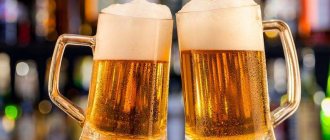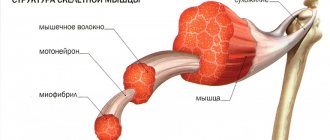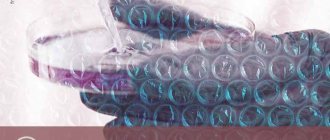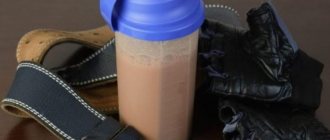Knowledgeable people say that health should be protected from a young age. You should not ruin yourself with alcohol, because it is addictive, and in the future a person will drink more.
Eventually, your body's recovery from quitting alcohol will become difficult and you will have to work to get back to normal.
The patient will notice changes in his condition already in the first days without ethanol. If it becomes very difficult, you will have to call the clinic, but the fight is worth continuing.
What happens in the body after quitting alcohol?
Many different processes will happen in a person’s body if he stops drinking. The most painful way out of binge drinking will be for hardcore alcoholics; giving up alcohol will be quite mild for those who rarely drink. It all depends on the “experience” of use.
Alcoholics, after stopping frequent intake of products containing ethanol, begin to experience a hangover that can last for several months. The person feels bad. He constantly has a headache, has problems with his liver, and is plagued by unpleasant pain in his muscles. But such a condition does not at all indicate that you need to continue drinking (to relieve symptoms); on the contrary, in difficult times you need to fight. The duration of the restructuring process depends on the stage of alcoholism.
If a person has been drinking ethanol for many decades, and has been abusing it, then one should not hope for instant improvements. After giving up alcohol, severe intoxication will occur. This is what causes poor health over a long period. The body will not immediately begin to recover; first it needs to be rid of harmful substances and this is done in the clinic.
Withdrawal syndrome
Alcohol withdrawal syndrome is sometimes confused with a hangover; some of their symptoms are the same, but only the second ends quickly, but withdrawal lasts for weeks. It is quite difficult to suppress this syndrome at home. The patient requires hospitalization. The abstinence time depends on the strength of the particular organism, as well as on the daily dose of alcohol and the “experience” of consumption.
Withdrawal syndrome always manifests itself in different ways, and scientists are still arguing about how it develops. They do not have a common opinion. Some alcoholics suffer greatly from the liver, others from the cardiovascular system, others from the kidneys, and from others from the brain. What experts confirm for sure is the fact of the influence of alcohol on all human organs and systems. Long-term alcohol consumption causes chronic poisoning. Toxins do not have time to be processed and eliminated from the body.
When an alcoholic abruptly stops drinking ethanol, the organs and systems are in a kind of trance. They lack stimulants to work. They are already accustomed to working together with alcohol and do not immediately adapt to a normal existence without it. The latter will still happen, but not quickly, it takes time, the duration of abstinence is 1-30 days.
There are many signs of alcohol withdrawal syndrome:
- the drunkard is sick;
- he suffers from tachycardia or hypertension;
- have hallucinations;
- restless sleep or no sleep at all;
- there is irritation, depression and others.
A person will need hospitalization in severe cases:
- if fever is present;
- heat;
- abnormal modifications of organs.
https://youtu.be/q4m1gY2LdnA
The effect of alcohol on internal organs
After just a few servings, your legs begin to tangle, your reaction time slows down, your vision becomes blurred, your speech becomes confused, memory lapses are possible, and depression after sobering up is possible. All this happens because alcohol negatively affects brain function. However, these symptoms stop quite quickly, and the person does not think about what caused such a reaction.
If alcohol is consumed regularly and in large quantities, these manifestations are significantly aggravated. And its effect on brain function is noticeable over a much longer period of time. Ethanol contained in any alcohol contributes to the death of brain neurons, the mechanism of synthesis of regulators of nervous activity changes, which causes the psyche to become unstable. For example, a drinker, in the absence of ethanol entering the body, is in a state of depression. After some time, depending on the individual characteristics of the body, irreversible consequences occur for the nerve cells - they begin to die.
After the brain, the liver is the next area to suffer. When alcohol enters the body regularly, the liver does not have time to remove waste products from the body after consuming the next dose. In this regard, the liver ceases to perform its protective function properly, and decay products remain in the body, thereby harming other internal organs. Also, liver cells under the influence of alcohol begin to produce more ammonia, trying to overcome alcohol, but an excess of this substance in the body negatively affects the functioning of the brain and contributes to the death of its cells.
Thus, constant consumption of alcoholic beverages has a negative impact on the entire system, all organs are brought into a state of imbalance, and the body begins to slowly destroy itself. Damaged organs in the body are restored after complete abstinence from alcohol, but slowly and often not completely.
Recovery stages
If a person has been drinking for many years and suddenly stops, the body begins to get rid of accumulated toxins. It is advisable to help him with this in order to reduce the negative effects: photophobia, vomiting, fever, high blood pressure, tremor, headache and others.
A day later
The patient is very ill, he is tormented by terrible headaches, he does not want to eat, and he cannot sleep. The drunkard feels sick, his thoughts are confused. Depression appears. A person is tormented by a feeling of guilt because he drank an impressive amount of alcohol the day before. Attacks of aggression are possible. I really want to drink.
Two days later
The previous symptoms remain, but the pain subsides a little. A person wants to be alone; crowds of people are unpleasant for him. Intermittent sleep, no appetite. Dark thoughts appear, thirst torments. Pain in the right side under the ribs.
Three days later
The drunkard is irritated by loud noises, he is aggressive, and headaches do not go away. There is a danger of developing alcoholic psychosis. The body begins to rebuild. He is tormented by nightmares and dizzy.
Five days later
This period is characterized by the appearance of appetite, the symptoms of a hangover weaken. Food is poorly digested and there is pain in the liver.
After 7-8 days
Thoughts become clear, sleep returns to normal. There is no more hangover syndrome, nightmares no longer torment, there are:
- moistening of the epithelium, its shade becomes different;
- no more digestive problems;
- the liver is restored.
After 2 weeks
The brain begins to work better, the head does not hurt, shortness of breath disappears, and the blood pressure returns to normal.
A month later
Ethanol is cleared from the brain after 21 days. When a month has passed, its breakdown products will disappear from the body. The person is already quite weaned from alcohol, he is losing weight. Puffiness disappears along with bags under the eyes. The facial tone is evened out and the patient's mood improves.
After 60 days
This period is marked by the complete restoration of the body's immune defense.
After 3 months
The person feels much better. He sleeps well and his nervous system functions are stabilizing.
Six months later
The patient's moral traits are noticeably restored.
One year later
Human organs and systems have recovered significantly and are functioning normally. The functioning of the liver, nervous system, pancreas, and kidneys improves. A person’s mental health returns to normal, he becomes a worthy member of society.
How individual organs are reanimated
Organs and systems begin to work differently after a person gives up alcohol.
Important biochemical processes occur in the body. Cells that are accustomed to working with alcohol and have experienced shock, after its withdrawal, after a while, learn to work without ethanol. Body functions improve noticeably.
Alcohol destroys the cerebral cortex. With an alcohol dosage of 50 g, the blood will be fluid, red blood cell aggregation decreases, and these cells become more mobile. Under the influence of alcohol, the membranes of nerve cells are destroyed. If a person continues to drink, dehydration will occur; the biological fluid will become thicker due to lack of water. Blood cells stick together, forming blood clots. These, in turn, clog the vessels, tissue hypoxia is observed, and neurons die as a result. Drinking alcohol can cause a stroke.
Can the liver heal on its own?
The liver is distinguished by its ability to heal itself. Moreover, for this, the presence of 25% healthy tissue is sufficient. Therefore, even after the removal of part of an organ, the organ is restored to its original size over time.
This process occurs at different speeds. The period required for recovery depends both on the nature of the lesion and on the presence (absence) of concomitant pathologies. The mechanism of liver tissue regeneration is not fully understood. However, the causes of organ fibrosis are known. In addition, a limit has been set at which self-healing of the liver becomes impossible. In such cases, transplantation is required.
How to recover from alcohol poisoning?
If a person has had too much drinking the day before and feels unwell, then he needs to take a number of measures to improve his well-being. First, the stomach is washed. Then drink adsorbents (silicon dioxide, black coal) in the required quantity. To saturate the body's cells with oxygen, you need to drink Succinic acid, Aspirin or Glycine. A person needs to replenish moisture reserves after dehydration. To do this, drink rice or oatmeal broth, still mineral water. It is necessary to saturate the body with useful substances, that is, vitamins and microelements. To do this, drink freshly squeezed juices, honey drinks, and vitamin complexes.
At home, measures are taken to restore the body after alcohol, depending on how much was drunk the day before. If the poisoning is too severe, hospitalization is necessary. It will be possible to regain lost health at home only with slight intoxication.
Chronic alcoholism will require hospital treatment followed by rehabilitation in the community. But in most cases, you can still detoxify yourself.
What is a dislocation?
We call a dislocation the loss of contact of articular surfaces with each other. Injuries most often occur during sports or traffic accidents. People involved in volleyball, hockey, handball and winter sports are especially susceptible to this. Shoulder injuries require proper diagnosis.
One of the most complex types of shoulder injury is a shoulder dislocation. The causes and treatment are determined by the doctor after a careful examination of the victim. Further therapy consists of restoring the functioning of the joint and preventing complications.
Psychological help
With prolonged alcoholism, a person needs not only medical, but also psychological help. Detoxifying the body in a hospital setting and improving the functioning of various systems will bring only temporary results. After leaving the hospital, the person will start drinking again. Using the help of a psychologist is necessary to find out the cause of alcoholism and eliminate it.
- create motivation to quit alcohol;
- increase self-esteem;
- determine goals in life;
- find a new good job;
- improve relationships with loved ones;
- eliminate the causes of ethanol addiction;
- get rid of depression;
- part with negative factors in life and others.
How to speed up and improve the process
Leaving the muscles completely inactive is the wrong technique. You can optimize the recovery process using the following methods:
- Moderate cardio some time after the main workout.
- Stretching, which improves blood circulation and expels lactic acid.
- Massage is a great way to maintain the elasticity of tired muscles and improve blood circulation.
By using a differentiated approach to combined split training, you can improve your muscle gains without increasing your training intensity.
General Tips
Often, along with alcoholism, a person develops a craving for smoking, which has a very negative impact on health. Having overcome one bad habit, a person will be able to cope with another.
To get rid of the need to drink, you need to change your social circle. Drunk friends often encourage their friends, who have decided to take the right path, to drink.
If the habit of alcohol is not strong and the drinking experience is not long, then you will be able to recover from drinking at home. With chronic alcoholism, it is unlikely that you will be able to stop drinking alcohol on your own.
In addition, giving up ethanol yourself will be problematic. There is no need to hesitate or be afraid; in case of severe symptoms, it is advisable to call a doctor.
Binge drinking is not about overdoing it during the holidays. This is a period of prolonged (more than a day) alcohol consumption, during which alcohol intoxication develops. The problem is dangerous due to disruption of various body systems, negative consequences for the mental sphere, and social changes.
Binge drinking is one of the components of alcohol addiction. Typically, alcoholics alternate alcohol abuse with periods of abstaining from strong drinks. The average duration of a binge is 1-2 weeks. During this time, the decomposition products of alcohol have time to significantly poison the body. You should not expect to recover from the consequences immediately after quitting alcohol. It takes time to restore the body after binge drinking.
How many days the body recovers after binge drinking depends on the duration of the period of alcohol abuse, the total duration of development of alcohol dependence, and the personal characteristics of the person. Experienced alcoholics experience severe poisoning of the body, structural destruction of certain organs, and a general decline in vitality. Refusal of strong drinks causes painful sensations in such patients: headaches and muscle pains appear, and liver problems arise. It is quite difficult to improve your health in this case.
How long does it take for the body to recover?
Recovery after a long binge should be divided into two phases: fighting a hangover and renewing vital functions. The acute phase of withdrawal is observed within 2-3 days. It takes up to a week for the body to get out of this state. In about a month, alcohol decomposition products leave the body, and organ functions are restored.
The process of recovery of the body after binge drinking by day is as follows:
- First day. Severe headaches, vomiting, and tremors of the limbs are observed. During this period, the alcoholic becomes irritable, quickly falls into a state of aggression, and often directs negative emotions towards household members. Have problems sleeping.
- Second day. It is characterized by symptoms similar to the first day, but the pain is less severe. On the second day, the peak of emotional depression is recorded. A person suffers from depression and obsessive thoughts. The maximum number of suicides associated with alcoholism occurs during this period of time.
- Third day. What remains is a state of weakness and emotional instability. Mental problems increase (hallucinations, anxiety, insomnia). At the physical level, signs of changes in the body begin to appear, headaches and tingling in the liver are observed.
- Fifth day. Withdrawal symptoms subside and appetite returns. Due to the weakness of the body, eating may end in vomiting.
- A week later. By this time, the hangover syndrome is receding, and the mental state is normalized. There are no more problems with sleep, my thoughts are clear and clear. On the 7-8th day after giving up alcohol, a person’s complexion improves, circles under the eyes disappear, and the functioning of the digestive organs and liver normalizes.
- A month after giving up alcohol. Alcohol is eliminated from the body in 3 weeks. Its breakdown products leave the body within a month. During this period, a person notices a comprehensive improvement in well-being and external transformations. Former alcoholics lose a little weight, muscle tone appears, and teeth become whiter. Within 30 days, the emotional background is completely restored and the ability to think clearly returns. By this period, the patient is no longer bothered by surges in blood pressure or rapid heartbeat.
- In a year. You can trace positive changes in the body over a longer period. In the absence of structural changes, after 12 months all affected body systems return to normal: liver, pancreas, gastrointestinal tract, central nervous system.
What factors influence muscle recovery?
There are thousands of factors that affect muscle recovery time, but among them there are several main ones.
Factors you have no control over:
- age;
- genetic data;
- characteristics of a specific muscle group.
Factors that depend on you:
- your training experience;
- what program are you following?
- training intensity;
- How do you spend your rest days?
Non-training factors:
- your nutrition;
- taking medications;
- stress level;
- amount of sleep.
Genetics
The genetic component determines the number of slow and fast fibers in muscle tissue. Slow-twitch fibers are designed for endurance activities such as running and require less recovery time. Fast-twitch muscle fibers provide explosive movements, such as sprints or weightlifting, and these fibers take longer to recover. However, recovery time depends not only on the proportion of slow and fast fibers, but also on how you use them.
Muscle group
Large muscles are naturally stronger than small muscles, so in order to get a response from the gluteal or pectoral muscles, you need to provide them with a high level of load.
The higher the load, the longer the recovery.
Thus, on average, it takes about two days for small muscles to recover; larger muscles will recover at least three days.
Type of training
If you do not change the load for a long time, the muscles will recover faster. They will have time to adapt to a stable load, and training will not cause colossal damage. But the effectiveness of such training will be low; progress in the level of loads is necessary for progress in performance.
Also, progress and time for muscle recovery depend on the intensity of the load. To understand how intense your workouts are, you can do a simple test. If after two days you can withstand the same loads, for example, lift the same weight in the same number of repetitions, it means that the previous workout was not at maximum intensity. The exception is endurance training - metabolic or aimed at burning fat, for which the maximum muscle recovery time is two days.
How to restore the body after drinking alcohol: relieving a hangover
The consequences of a fun party with lots of alcohol are swelling of the face, depressed health, headache, increased excitability of the nervous system, causing a feeling of constant irritation. The listed unpleasant symptoms are associated with the process of decomposition of ethyl alcohol. To neutralize poisons, the body spends all its reserves of vitamins, minerals, and vital energy.
How to restore the body after drinking alcohol? There are the following proven recipes for dealing with hangover syndrome:
- Physical elimination of poisons . Effective ways to combat intoxication are an enema or gastric lavage. More humane methods include the use of enterosorbents and activated carbon.
- Drink plenty of fluids . The optimal solution for eliminating a hangover is fermented milk products (remove toxins from the body), mineral water or brine (restore salt balance).
- Water treatments . A bath or contrast shower helps to invigorate and combat dehydration.
- Glycine . The hangover condition is manifested by nervous tension, increased irritability, and aggressiveness. To overcome these unpleasant symptoms, you should take 1 tablet every hour, but no more than 5 per day.
- Cold compress . To get rid of headaches, you can use a cold compress. Just put a few ice cubes in a plastic bag and apply for 10-15 minutes. The blood vessels will narrow, the unpleasant sensations will subside.
- Essential oils . A bath with lavender or rosemary oil is an “ambulance” in relieving a hangover. A few drops are added to water at 35-40 degrees, the procedure lasts 15-20 minutes. Research shows that this product speeds up the removal of toxins by 25 times.
- Proper breakfast . It is important to force yourself to eat even if you have no appetite. Porridge, lean meat broth, and fermented milk products are suitable: they will help fill you up, but will not create additional stress on the gastrointestinal tract. It is recommended to drink tea, freshly squeezed juice or fruit drink.
How long does it take for the body to recover after binge drinking?
The speed of recovery of the body after prolonged drinking depends on many factors :
- patient's age;
- his general health;
- condition of the liver, pancreas and other organs;
- duration of the binge, etc.
Clinical studies show that men return to normal life faster than women.
How to restore the body after prolonged drinking? It is necessary to use medications and folk recipes to eliminate unpleasant symptoms. Getting rid of a hangover is not enough: it is important to normalize the functioning of the gastrointestinal tract, cardiovascular system, liver, kidneys and other organs.
Practice shows that stopping binge drinking at home is a difficult undertaking. To quickly improve the patient’s condition, you need to use the services of a narcologist . The optimal solution is to place the patient in a specialized rehabilitation center, where he will be under the supervision of doctors and away from “hot” temptations.
Practice shows that withdrawal symptoms disappear 3-6 days after a person stops drinking. Another 2-3 weeks are required to completely eliminate the signs of intoxication. Psychosomatic disorders caused by long-term alcohol abuse persist for up to several months after complete abstinence.
The relationship between the volume of muscle mass and the speed of recovery
Both ordinary athletes and scientists conducting research in the field of physical education and sports have long noticed that the speed of recovery of different muscles is not the same. The smaller the volume of an individual muscular element, the faster the healing processes of microtraumas occur in it. This seems logical, given that the smaller the muscle, the fewer lesions there are. Blood takes longer to pass through large muscle formations. The same can be said about the accumulation of lactic acid - its total amount in the latissimus dorsi muscles is incomparably greater than, for example, in the finger flexors in the forearm.
This pattern leads to the conclusion that the timing that determines the frequency of training and rest for different muscle groups should be different. There is an opinion that 48 hours is enough for complete recovery. This is only partly true. You need to approach the load differentiated. Two days in most cases is enough for small muscles - biceps, muscles, forearm, round. Large formations may require at least three days of rest.
Proper nutrition after binge drinking
How to restore the body after prolonged drinking? Doctors are unanimous in their opinion that it is important to build a proper diet. The following elements should be present in it :
- dairy and fermented milk products – neutralize toxins;
- watermelons, cucumbers, lingonberries are natural diuretics;
- fresh fruits and vegetables - saturate the body with vitamins;
- greens (parsley, dill, asparagus) – accelerates the elimination of alcohol breakdown products from the body;
- natural teas, freshly squeezed juices, fruit drinks - activate the gastrointestinal tract.
After alcohol abuse, it is recommended to give preference to light meals that will not create additional stress on the pancreas. Porridges, broths, hard-boiled eggs, boiled lean meat (chicken, turkey, rabbit), and white fish are useful.
Fried, fatty, pickled, salty, and foods containing a lot of spices are excluded from the patient’s daily diet. The listed dishes create additional stress on the stomach and intestines, already weakened by prolonged drinking.
Medications for recovery from binge drinking
To speed up the intoxication of the body, the patient is prescribed medications. These include :
- Activated carbon;
- smecta;
- enterosgel;
- polysorb, etc.
The listed drugs “bind” poisons located in the gastrointestinal tract and remove them from the body. To speed up metabolic processes, the patient is recommended to take intramuscular vitamins and diuretics.
The second group of medications prescribed after binge drinking is sedatives . Axiolytics and tranquilizers help overcome cravings for alcohol and normalize sleep.
If the patient’s condition is assessed as severe (severe intoxication, inability to take fluids due to constant vomiting), IV treatment is used to restore the body. The patient is given intravenous glucose solution or isotonic solution.
How to restore the body after alcohol at home?
Reliable helpers in the fight against the consequences of binge drinking are folk methods, the effectiveness of which has been proven over several generations.
The following effective recipes exist:
- Cabbage or cucumber pickle . Helps restore the water-salt balance disturbed by heavy libations.
- Tomato cocktail . Eliminates dry mouth, cleanses the body of toxins. To prepare it, beat one raw egg into a glass of tomato juice, add salt and pepper.
- Herbal teas . They fight dehydration and activate intestinal function. Traditional medicine recommends tea made from mint, lemon balm, and chamomile. To speed up the effect, additional ingredients are added: rosemary, dandelion, willow bark.
- Lemon juice . Tones, replenishes vitamin C reserves in the body, reduces the time of recovery from binge drinking. It is recommended to use it in its pure form, 2-3 tbsp. spoons after each meal or add to green tea in a similar amount.
Traditional medicine gives a lot of advice on how to restore the body after alcohol. To return to normal well-being faster, you should remember that the fight against intoxication is an important job that requires an integrated approach. It is important to combine medication with proper nutrition and lifestyle adjustments.











